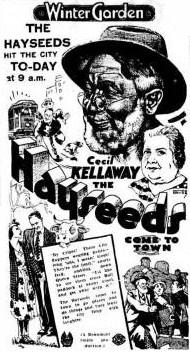The Hayseeds
| The Hayseeds | |
|---|---|
 Contemporary advertisement for film | |
| Directed by | Beaumont Smith Raymond Longford (associate)[1] |
| Written by | Beaumont Smith |
| Produced by | Beaumont Smith |
| Starring | Cecil Kellaway |
| Cinematography | Tasman Higgins |
| Edited by | Frank Coffey |
| Music by | Alf Lawrence Fred Chapple |
Production company | J.C. Williamson Picture Productions |
| Distributed by | British Empire Films[2] |
Release date | 8 December 1933[3] |
Running time | 98 mins |
| Country | Australia |
| Language | English |
| Budget | £4,500[4][5][6] or £6,000[7] |
| Box office | £20,000[7][8] or £16,000[6] |
The Hayseeds is a 1933 Australian musical comedy from Beaumont Smith. It centres on the rural family, the Hayseeds, about whom Smith had previously made six silent films, starting with Our Friends, the Hayseeds (1917). He retired from directing in 1925 but decided to revive the series in the wake of the box office success of On Our Selection (1932).[9] It was the first starring role in a movie for stage actor Cecil Kellaway.
It was also known as The Hayseeds Come to Town.
Plot[]
Wealthy Mary Townleigh gets lost in the bush and hurts her ankle, but is rescued and stays with the Hayseed family. She starts a romance with their neighbour, Englishman John Manners. When Joe Hayseed and his girlfriend Pansy Regan decide to get married, the Hayseeds and John visit Sydney to stay with the Townleighs. John is accused of being a fugitive of justice but is eventually proved innocent and he and Mary get married.[10]
Cast[]
- Cecil Kellaway as Dad Hayseed
- Kenneth Brampton as Mr. Townleigh
- Arthur Clarke as John Manners
- Shirley Dale as Mary Townleigh
- Bryan Kellaway as Billy
- John Moore as Henry Westcott
- Tal Ordell as Joe Hayseed
- Vincent Pantin as Lord Mornington
- Molly Raynor as Pansy Ragen
- Phyllis Steadman as Polly
- Stan Tolhurst as Sam
- Katie Towers as Mum Hayseed
- the J.C. Williamson Chorus (singing hikers)
- the Richard White Girls
- Jimmy Coates and his Orchestra
Production[]
The movie was shot at Cinesound's studios in Rushcutter's Bay in August and September 1933, with location work near Pymble. Many of the cast, including Kellaway, John Moore and Shirley Dale, were appearing in the play Music in the Air during filming.[11]
The movie was a semi musical with a number of songs and dance sequences. The latter were produced by Richard White, who ran a dance academy in Sydney.[12]
Cecil Kellaway's son, Brian, made his film debut alongside his father.[13]
Director[]
There is some debate as to the true director of the film. While some sources say that Beaumont Smith both scripted and directed the picture, Smith himself announced that Raymond Longford would direct the picture,[14] and newspapers of the era also gave the credit to Longford.
Reception[]
Reviews for the film were mixed[15][16] but it proved popular with audiences on release.
By the end of 1934 it was estimated to have earned £16,000 in Australia and an overall profit of £5,900.[5][6]
The film was still screening in cinemas in 1950.[17]
References[]
- ^ "Raymond Longford", Cinema Papers, January 1974 p51
- ^ "BEAUMONT SMITH BEGINS WORK ON TALKING PICTURE". Il Giornale Italiano. Sydney: National Library of Australia. 6 September 1933. p. 5. Retrieved 31 May 2012.
- ^ Ross Cooper,"Filmography: Beaumont Smith", Cinema Papers, March–April 1976 p333
- ^ Andrew Pike and Ross Cooper, Australian Film 1900–1977: A Guide to Feature Film Production, Melbourne: Oxford University Press, 1998, 164.
- ^ Jump up to: a b "Counting the Cash in Australian Films"', Everyones 12 December 1934 p 19-20
- ^ Jump up to: a b c "Film Industry In Australia". The News. Adelaide: National Library of Australia. 11 June 1935. p. 4. Retrieved 17 March 2015.
- ^ Jump up to: a b Everyones, Everyones Ltd, 1920, retrieved 29 March 2019
- ^ "Advertising". The Sydney Morning Herald. National Library of Australia. 16 April 1935. p. 10. Retrieved 25 July 2012.
- ^ Vagg, Stephen (23 December 2019). "Australian Film Musicals You Probably Didn't Realise Existed". Filmink.
- ^ "PRINCE OF WALES THEATRE". The West Australian. Perth: National Library of Australia. 23 June 1934. p. 13. Retrieved 31 May 2012.
- ^ ""THE HAYSEEDS."". The Sydney Morning Herald. National Library of Australia. 6 September 1933. p. 8. Retrieved 29 January 2012.
- ^ "Advertising". The Sydney Morning Herald. National Library of Australia. 22 July 1933. p. 2. Retrieved 29 January 2012.
- ^ "Edmonton Regent Theatre". The Cairns Post. Qld.: National Library of Australia. 27 February 1935. p. 3. Retrieved 31 May 2012.
- ^ "AUSTRALIAN FILM". The Sydney Morning Herald. National Library of Australia. 22 July 1933. p. 8. Retrieved 28 January 2012.
- ^ "FILM REVIEWS". The Sydney Morning Herald. National Library of Australia. 11 December 1933. p. 5. Retrieved 31 May 2012.
- ^ "PRIVATE VIEWS". The Australian Women's Weekly. National Library of Australia. 16 December 1933. p. 26. Retrieved 31 May 2012.
- ^ "Palace Theatre". The Cairns Post. Qld.: National Library of Australia. 11 July 1950. p. 2. Retrieved 31 May 2012.
External links[]
- The Hayseeds in the Internet Movie Database
- The Hayseeds at Australian Screen Online
- The Hayseeds at National Film and Sound Archive
- The Hayseeds at Oz Movies
- English-language films
- 1933 films
- Australian films
- Films directed by Beaumont Smith
- Films directed by Raymond Longford
- Australian black-and-white films
- Australian musical drama films
- 1930s musical drama films
- 1933 drama films